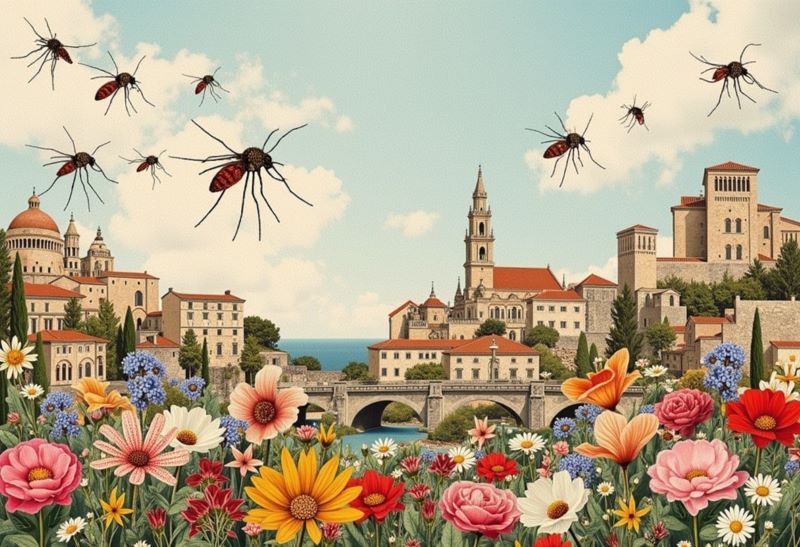Wednesday, July 2, 2025
As the summer approaches, holidaymakers in popular European destinations like France, Spain, and Italy face an evolving health threat linked to the changing climate. The European Centre for Disease Prevention and Control (ECDC) has issued a warning, highlighting a significant increase in mosquito-borne diseases across the continent. The culprit: longer and more intense mosquito seasons fueled by climate change.
Mosquito species responsible for spreading diseases such as dengue, chikungunya, Zika, and West Nile virus are expanding across Europe, causing concern among health officials. Travelers heading to these popular European destinations should be aware of the risks and take necessary precautions.
The Mosquito Species Spreading Across Europe
Several mosquito species, once mostly confined to tropical or subtropical regions, are now thriving in parts of Europe. These include:
Aedes albopictus (Asian tiger mosquito) – Known to transmit dengue, chikungunya, and Zika viruses, this species has made substantial inroads into Europe, currently being present in 16 countries and 369 regions. A decade ago, it was only found in 114 regions.Aedes aegypti (Yellow fever mosquito) – Although once eradicated from Europe, this mosquito species has re-emerged, particularly in Cyprus, posing a risk for diseases like yellow fever.Culex pipiens (Common house mosquito) – Responsible for spreading West Nile virus, this species continues to be a major health concern, particularly during the summer and early autumn months.
With changing weather patterns and rising temperatures, these mosquitoes are now found in regions where they were previously uncommon, allowing for the spread of diseases that were once rare in Europe.
Rising Cases of Mosquito-Borne Diseases in Europe
Recent years have seen a steady increase in the number of mosquito-borne disease cases across Europe. In 2024 alone, 304 cases of locally acquired dengue were reported—up significantly from 130 cases in 2023 and 71 cases in 2022. The spread of West Nile virus has also been significant, with 1,436 cases recorded in 2024 across 19 countries and 212 regions. This upward trend in disease transmission is directly linked to the expanding mosquito populations.
Notably, France has reported six outbreaks of chikungunya virus in 2025. Cases of this debilitating illness appeared earlier in the season than usual, with symptoms reported as early as late May and June. Historically, such cases have occurred in July or August, signaling an earlier onset of mosquito activity.
The situation continues to evolve, with Spain and Italy also experiencing rising incidences of these mosquito-borne diseases. Health authorities in these regions are on high alert, encouraging both residents and visitors to adopt preventive measures.
Precautionary Measures for Travelers and Locals
To combat the growing risk of mosquito-borne illnesses, the ECDC has provided public health guidance that emphasizes both personal protective measures and environmental actions. These precautions aim to reduce exposure to mosquitoes and limit breeding grounds.
Personal Measures:
Use Mosquito Repellents: Apply insect repellents to exposed skin, particularly during the day and at dusk when mosquito activity is highest.Wear Protective Clothing: Long sleeves, trousers, and hats can protect against mosquito bites. This is particularly important in areas with active mosquito populations.Sleep Safely: Whenever possible, sleep under bed nets or in rooms equipped with screens or air-conditioning, which prevent mosquitoes from entering.Post-Travel Precautions: Travelers returning from regions where mosquito-borne diseases are prevalent, such as those in Southeast Asia or parts of South America, should continue taking preventive measures for at least three weeks. This helps prevent the introduction of viruses to areas where mosquitoes may be present.
Environmental and Community Actions:
Remove Standing Water: Standing water in containers like buckets, flowerpots, or clogged gutters provides ideal breeding grounds for mosquitoes. Regularly emptying these water sources can help limit mosquito populations.Larvicides and Adulticides: In cases of active outbreaks, local authorities may use larvicides in larger bodies of water and adulticides to control the adult mosquito population. However, the ecological impact of these chemicals is carefully considered.Community Engagement: Local communities must be actively involved in efforts to reduce mosquito habitats, especially in regions where these mosquitoes are more prevalent.How Climate Change is Impacting Europe’s Mosquito Season
The increase in mosquito activity and the spread of disease in Europe are linked directly to climate change. Rising temperatures and altered precipitation patterns have created more favorable conditions for mosquitoes to thrive. With hotter summers and milder winters, mosquitoes now have longer breeding seasons, allowing them to spread across new territories in Europe.
As climate change continues to impact the continent, mosquito-borne diseases are expected to become more widespread. Health experts are closely monitoring this trend, providing updated guidance to help mitigate risks.
Take Action to Stay Safe
While Europe remains a top destination for summer travel, understanding the rising health risks associated with mosquito-borne diseases is critical for both locals and visitors. By staying informed, taking preventative measures, and following public health advice, travelers can help protect themselves and others from these potentially harmful infections.
If you’re planning a trip to France, Spain, or Italy, ensure that you are prepared for the evolving mosquito season. It’s always better to be cautious and proactive about mosquito prevention, especially as climate change continues to reshape the landscape of infectious diseases in Europe.
Stay safe, and enjoy your travels with peace of mind, knowing that small steps can go a long way in reducing the risks posed by mosquitoes.
«Enjoyed this post? Never miss out on future posts by following us»
Tags: Aedes albopictus, Chikungunya, chikungunya Spain, climate change, climate change Europe, cyprus, dengue, dengue France, ECDC, ECDC warning, Europe, European travel health risks, france, Italy, mosquito prevention tips, mosquito season, mosquito season Europe, Mosquito-Borne Diseases, spain, West Nile Virus
